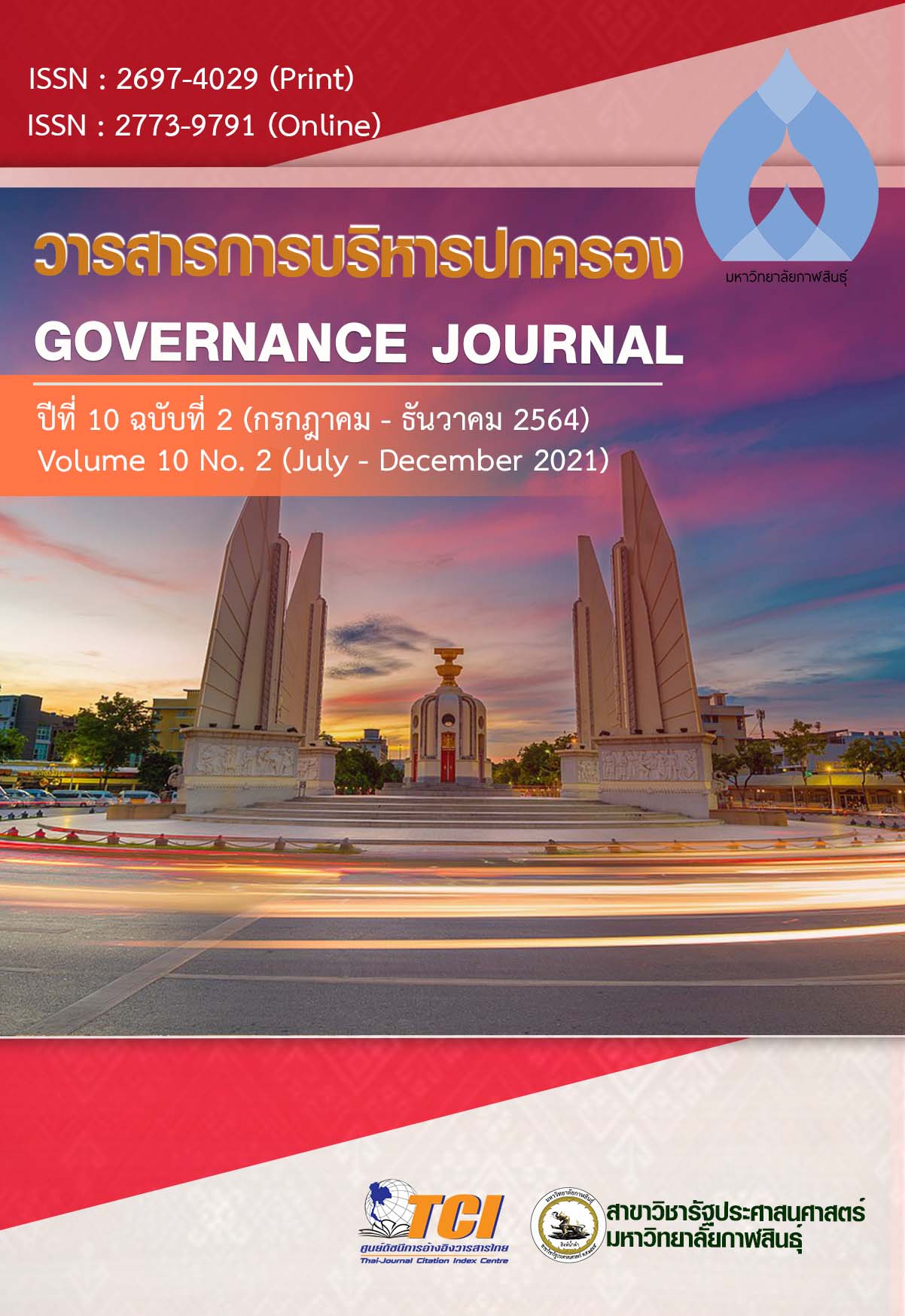แนวทางการบริหารเครือข่ายกลุ่มผู้ใช้น้ำชลประทาน เพื่อเพิ่มประสิทธิภาพการบริหารจัดการภาครัฐด้านการบริหารจัดการทรัพยากรน้ำ : กรณีศึกษาลุ่มน้ำลำตะคอง
DOI:
https://doi.org/10.14456/gjl.2021.30คำสำคัญ:
การบริหารเครือข่าย, กลุ่มผู้ใช้น้ำชลประทาน, การบริหารจัดการภาครัฐ, การบริหารจัดการทรัพยากรน้ำ, ลุ่มน้ำลำตะคองบทคัดย่อ
การศึกษาครั้งนี้มีวัตถุประสงค์ 1) เพื่อศึกษาการบริหารเครือข่ายกลุ่มผู้ใช้น้ำชลประทาน และ 2) เพื่อเสนอแนวทางการบริหารเครือข่ายกลุ่มผู้ใช้น้ำชลประทาน ใช้การวิจัยเชิงคุณภาพ เก็บข้อมูลด้วยเทคนิคการสัมภาษณ์กลุ่มและการสัมภาษณ์เชิงลึก ตามแนวทางการสัมภาษณ์แบบกึ่งโครงสร้างกับผู้ให้ข้อมูลสำคัญ (Key Informants) ได้แก่ หัวหน้ากลุ่มผู้ใช้น้ำชลประทาน จำนวน 30 คน ร่วมกับการสังเกตแบบมีส่วนร่วมและไม่มีส่วนร่วมระหว่างเดือนมีนาคม พ.ศ. 2561 ถึง เดือนกรกฏาคม พ.ศ. 2562 วิเคราะห์และนำเสนอข้อมูลโดยการพรรณนาวิเคราะห์ (Descriptive Analysis) ผลการวิจัยพบว่า 1) การบริหารเครือข่ายกลุ่มผู้ใช้น้ำชลประทาน ประกอบด้วย การเข้าถึงทรัพยากร การแบ่งปันความเสี่ยง ความมีประสิทธิภาพ การประสานงานที่ต่อเนื่องการเรียนรู้และการมีจริยธรรม 2) แนวทางการบริหารเครือข่ายกลุ่มผู้ใช้น้ำชลประทาน ประกอบด้วย การให้ความสำคัญในการกำกับหรือการจัดระเบียบ การสร้างความร่วมมือ การสร้างทีมงาน การสร้างภาวะผู้นำ และ การเจรจาต่อรอง
Downloads
เอกสารอ้างอิง
ลุ่มน้ำลำตะคองแบบบูรณาการ. สำนักงานทรัพยากรน้ำภาค 5
กรมทรัพยากรน้ำ.
ฐกร กาญจน์จิรเดช, มยุรี รัตนเสริมพงศ์ และ สมบูรณ์ สุขสำราญ (2561).
รูปแบบการมีส่วนร่วมของชุมชน ในการบริหารจัดการน้ำอย่างยั่งยืนของจังหวัดอุทัยธานี ตามแนวปรัชญาเศรษฐกิจพอเพียง
วารสารสันติศึกษาปริทรรศน์ มจร. ปีที่ 6 ฉบับที่ 2 (เมษายน-
มิถุนายน 2561) น.537-552.
นันธิดา จันทร์ศิริ. (2558). การจัดการเครือข่ายในกระบวนการนโยบาย
สาธารณะ. สารอาศรมวัฒนธรรมวลัยลักษณ์. Vol 15 No 1 (2015): ตุลาคม 2557 - มีนาคม 2558.
วรัชยา เชื้อจันทึก. (2550). การจัดองค์กรท้องถิ่น. นครราชสีมา. เอกสาร
ประกอบการสอน.
สัจจา บรรจงศิริ, บำเพ็ญ เขียวหวาน, ปาลีรัตน์ การดี และ รสิกา อังกูร.
(2559). แนวทางการบริหารจัดการทรัพยากรน้ำแบบมีส่วนร่วม:
กรณีศึกษาพื้นที่ลุ่มน้ำยม (รายงานวิจัย). นนทบุรี: มหาวิทยาลัยสุโขทัยธรรมาธิราช.
เสรี พงศ์พิศ. (2546). วิธีคิด วิธีทำ แผนชีวิต เศรษฐกิจชุมชน. กรุงเทพฯ :
สำนักพิมพ์ภูมิปัญญาไท.
Abdullaev, I., Kazbekov. J., Manthritilake, H. & Jumaboev, K.
(2010). Water User Groups in Central Asia: Emerging Form of Collective Action in Irrigation Water Management. Water Resources Management.
volume 24, pages1029–1043.
Chan.T, Ross. H., Hoverman. S., Powel. B. (2010). Participatory
development of a Bayesian network model for catchment‐based water resource management. Water resource research, VOL. 46, W07544, doi:10.1029/2009WR008848.
Huxham.C & Vangen. (2005). Managing to Collaborate: The
theory and practice of collaborative advantage. London: Routledge.
Klijn. E., Ysa. T., Sierra. V., Berman. E., Edelenbos.J., & Chen. D.
(2015). The Influence of Network Management and Complexity on Network Performance in Taiwan, Spain and the Netherlands, Public Management Review, 17:5, 736-764. Retrieved from
https://www.tandfonline.com/doi/abs/10.1080/14719037.2014.957340
Morton. W. L., Selfa. T., Becerra. A. T. (2010). Shared Leadership
for Watershed Management. Pathways for Getting to Better Water Quality: The Citizen Effect pp 29-39.
Nazari. B., Liaghat. A., Akbari. M. R., Keshavarz. M. (2018). Irrigation
water management in Iran: Implications for water use efficiency improvement. Agricultural Water Management.
Volume 208, 30 September 2018, Pages 7-18.
Wangombe. S. W. (2013). Influence of water resource users’
associations (WRUAs) in water conflict Resolution among the communities of subcatchment 5be in Meru-Laikipia
Counties, Kenya. A research project report submitted in partial fulfillment for the requirements of the award of Master of Arts degree in project planning and
management of the University of Nairobi
Translated Thai References
Banchongsiri. S., Keowan. B., Karndee. P., & Angkura. R. (2016).
Guidelines for participatory water resource management:
Case study of the Yom River Basin (Research report). Nonthaburi: Sukhothai Thammathirat Open University.
Department of Water Resource. (2010). Strategic Integrated
Water Resources and Lam Ta Kong basin
Management. Water Resource Regional Office 5. Department of Water Resource.
Karnjiradet. T., Rattanasermpong. M., & Suksamran. S.
(2018). A Model of Community Participation in Water Management in Uthai Thani Province According to the Philosophy of Sufficiency Economy. Journal of MCU Peace Studies Vol.6 No.2 (July-June 2018)
Pages 537-552.
Nantida Jansiri. (2015). Network management in the public
policy process. Walailak Abode of Culture
Journal. Vol 15 No 1 (2015): October 2014 - March 2015.
Varatchaya Chueachanthuek. (2007). Local Organization
Management. Nakhonratchasima.
Nakhon Ratchasima Rajabhat University.
Seri Phongphit. (2003). How to think about how to create a
community economic life plan. Bangkok :
Wisdom Publisher.
ดาวน์โหลด
เผยแพร่แล้ว
รูปแบบการอ้างอิง
ฉบับ
ประเภทบทความ
สัญญาอนุญาต
ลิขสิทธิ์ (c) 2021 วารสารการบริหารปกครอง

อนุญาตภายใต้เงื่อนไข Creative Commons Attribution-NonCommercial-NoDerivatives 4.0 International License.








